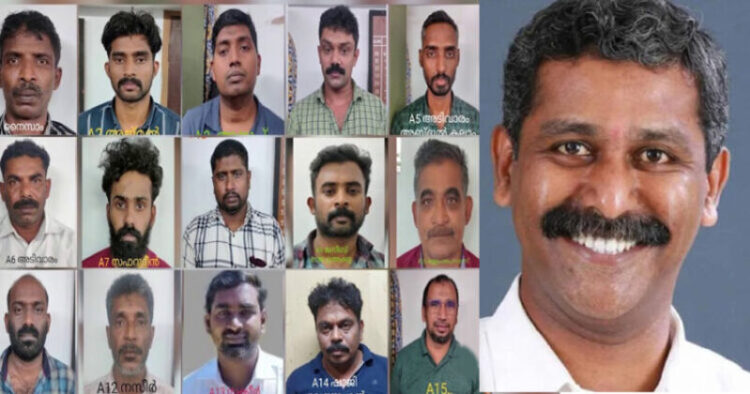In a rare and severe judgment, all 15 accused in the murder case of BJP leader Adv. Ranjith Sreenivasan have been awarded capital punishment. Ranjith Sreenivasan, the state secretary of BJP’s OBC Morcha, met a brutal demise on December 19, 2021, at his Alappuzha residence. The assailants, 12 in number and riding six two-wheelers, invaded Ranjith’s home during the early hours, subjecting him to a horrific attack witnessed by his mother, wife Adv. Nisha, and two young daughters.
The assailants stripped Ranjith before assaulting him with hammers, swords, and daggers, leaving him unrecognisable. The grotesque incident unfolded as part of a larger conspiracy targeting several Sangh-inspired social workers. The outlawed PFI’s killer squads possessed detailed information, including pictures, addresses, and family members of prominent Sangh and Sangh-inspired workers.
The convicted individuals, Navas, Shameer, Nazeer, Zakhir Hussein, Shaji Poovathingal, Shernaz Ashraf, Nizam, Ajmal, Anoop, Mohammed Asalam, Salam Ponnad, Abdul Kalam, Safarudheen, Mushad, and Jaseem Raja, received the capital punishment for their involvement in this heinous crime.
Ranjith’s murder, executed in front of his family, served as a stark reminder of the rising threats faced by Sangh-inspired workers. The gruesome act aimed not only to silence a prominent leader but also to instill fear in others associated with similar ideologies.
The investigation revealed a chilling conspiracy, as the PFI convicts possessed detailed information about multiple Sangh-inspired social workers, posing a grave threat to their lives and safety. The detailed planning and execution of the crime point towards a larger network involved in silencing voices contrary to their ideology.
The legal proceedings and the subsequent capital punishment highlight the severity of the crime and the commitment to justice for victims of political violence. The verdict serves as a deterrent against future attempts to curb freedom of expression and intimidate individuals based on their political affiliations.
Judge V.G. Sreedevi of the Additional Sessions Court in Mavelikkara, Alappuzha district, has sentenced all 15 accused in the murder case of BJP leader Adv. Ranjith Sreenivasan. The convicts face charges under various sections of the Indian Penal Code (IPC), including 449, 447, 506 (2), 324, 323, 341, and 201. The court found all accused guilty on January 20.
The 1st to 8th accused were directly involved in the cold-blooded murder, with some strategically stationed outside to prevent any escape or outside help for Ranjith. Their guilt extends beyond murder, encompassing charges of criminal conspiracy, destruction of evidence, threatening witnesses, and intrusion into the victim’s house.
The prosecution, emphasising the case’s rarity, sought the maximum punishment for the accused. The murder of Ranjith Sreenivasan, a state secretary of BJP’s OBC Morcha, unfolded as the culmination of months-long conspiracies, highlighting the gravity of the crime.
This gruesome incident draws parallels with the brutal murder of Bharatiya Janata Yuva Morcha leader Jayakrishnan Master on December 1, 1999. Master was killed by CPM goons in front of Standard 6 children in a Thalasserry school while he was teaching. His body was subjected to numerous hacks, mirroring the brutality witnessed in Ranjith’s case.
Ranjith’s murder, executed in the presence of his family, echoes historical incidents of political violence in the region. The court’s decision to award capital punishment signifies a stern response to such acts, emphasizing justice for victims and deterring future attempts to suppress dissenting voices.
The months-long conspiracies leading to Ranjith’s murder underscore the challenges faced by political activists, particularly those aligned with ideologies opposed to the accused. The verdict, delivered by Judge V.G. Sreedevi, not only holds the perpetrators accountable for their actions but also reinforces the commitment to upholding democratic values and ensuring justice in the face of targeted violence.
The murders of Jayakrishnan Master and Ranjith Sreenivasan, although occurring years apart, bear striking similarities, prompting introspection within the state of Kerala. Jayakrishnan Master, a beloved figure, and Ranjith Sreenivasan, a respected BJP leader, shared common traits of being mild-mannered and well-regarded by their communities.
Master, revered by students, parents, and locals, faced a shocking demise in 1999 while teaching in a Thalasserry school. Ranjith, the state secretary of BJP’s OBC Morcha, met a similar fate in 2021 when attacked at his Alappuzha home during the early hours, a place he considered safe.
Both victims, known for their calm demeanours, never anticipated such brutal attacks in seemingly secure environments—Master in the classroom and Ranjith at home. Ranjith, devoid of any criminal record, enjoyed widespread love and respect in his community and the legal circles where he practiced.
These incidents raise questions that resonate with the collective conscience of the state’s population. Ranjith’s murder, in particular, underscores the concerns articulated by Sangh, BJP, and Sangh-inspired leaders regarding Kerala’s perceived status as a haven for extremist and terrorist groups.
The accusations, long voiced by Sangh and BJP, contend that both the ruling CPM-led Left Democratic Front (LDF) and the opposition Congress-led United Democratic Front (UDF) have downplayed the issue. This alleged neglect is attributed to the vote-bank politics practiced by both political fronts, engaging in a competitive yet detrimental game.
Ranjith’s tragic murder serves as a grim validation of the concerns expressed by Sangh and BJP, highlighting the need for a thorough examination of the state’s security landscape. The shared characteristics between the two victims evoke a sense of vulnerability for political activists and leaders aligned with ideologies opposed to those perpetrating such heinous crimes.
The court’s verdict aims to send a strong message against those seeking to curtail freedom of expression through violence, reaffirming the judiciary’s role in safeguarding democratic principles.




















Comments